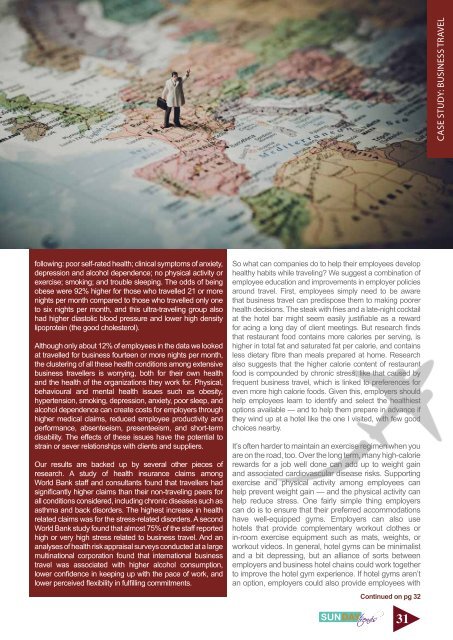Create successful ePaper yourself
Turn your PDF publications into a flip-book with our unique Google optimized e-Paper software.
CASE <strong>ST</strong>UDY: BUSINESS TRAVEL<br />
following: poor self-rated health; clinical symptoms of anxiety,<br />
depression and alcohol dependence; no physical activity or<br />
exercise; smoking; and trouble sleeping. The odds of being<br />
obese were 92% higher for those who travelled 21 or more<br />
nights per month compared to those who travelled only one<br />
to six nights per month, and this ultra-traveling group also<br />
had higher diastolic blood pressure and lower high density<br />
lipoprotein (the good cholesterol).<br />
Although only about 12% of employees in the data we looked<br />
at travelled for business fourteen or more nights per month,<br />
the clustering of all these health conditions among extensive<br />
business travellers is worrying, both for their own health<br />
and the health of the organizations they work for. Physical,<br />
behavioural and mental health issues such as obesity,<br />
hypertension, smoking, depression, anxiety, poor sleep, and<br />
alcohol dependence can create costs for employers through<br />
higher medical claims, reduced employee productivity and<br />
performance, absenteeism, presenteeism, and short-term<br />
disability. The effects of these issues have the potential to<br />
strain or sever relationships with clients and suppliers.<br />
Our results are backed up by several other pieces of<br />
research. A study of health insurance claims among<br />
World Bank staff and consultants found that travellers had<br />
significantly higher claims than their non-traveling peers for<br />
all conditions considered, including chronic diseases such as<br />
asthma and back disorders. The highest increase in health<br />
related claims was for the stress-related disorders. A second<br />
World Bank study found that almost 75% of the staff reported<br />
high or very high stress related to business travel. And an<br />
analyses of health risk appraisal surveys conducted at a large<br />
multinational corporation found that international business<br />
travel was associated with higher alcohol consumption,<br />
lower confidence in keeping up with the pace of work, and<br />
lower perceived flexibility in fulfilling commitments.<br />
So what can companies do to help their employees develop<br />
healthy habits while traveling? We suggest a combination of<br />
employee education and improvements in employer policies<br />
around travel. First, employees simply need to be aware<br />
that business travel can predispose them to making poorer<br />
health decisions. The steak with fries and a late-night cocktail<br />
at the hotel bar might seem easily justifiable as a reward<br />
for acing a long day of client meetings. But research finds<br />
that restaurant food contains more calories per serving, is<br />
higher in total fat and saturated fat per calorie, and contains<br />
less dietary fibre than meals prepared at home. Research<br />
also suggests that the higher calorie content of restaurant<br />
food is compounded by chronic stress, like that caused by<br />
frequent business travel, which is linked to preferences for<br />
even more high calorie foods. Given this, employers should<br />
help employees learn to identify and select the healthiest<br />
options available — and to help them prepare in advance if<br />
they wind up at a hotel like the one I visited, with few good<br />
choices nearby.<br />
It’s often harder to maintain an exercise regimen when you<br />
are on the road, too. Over the long term, many high-calorie<br />
rewards for a job well done can add up to weight gain<br />
and associated cardiovascular disease risks. Supporting<br />
exercise and physical activity among employees can<br />
help prevent weight gain — and the physical activity can<br />
help reduce stress. One fairly simple thing employers<br />
can do is to ensure that their preferred accommodations<br />
have well-equipped gyms. Employers can also use<br />
hotels that provide complementary workout clothes or<br />
in-room exercise equipment such as mats, weights, or<br />
workout videos. In general, hotel gyms can be minimalist<br />
and a bit depressing, but an alliance of sorts between<br />
employers and business hotel chains could work together<br />
to improve the hotel gym experience. If hotel gyms aren’t<br />
an option, employers could also provide employees with<br />
Continued on pg 32<br />
31

















